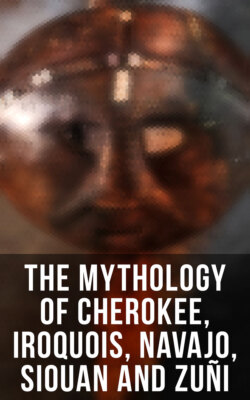Читать книгу The Mythology of Cherokee, Iroquois, Navajo, Siouan and Zuñi - James Mooney - Страница 75
На сайте Литреса книга снята с продажи.
No 'Good' or 'Bad' Gods
ОглавлениеBut, oddly enough, the gods are usually exempt from these laws by which their worshippers are bound. We find them murderous, unfilial, immoral, polygamous, and often irreverent. This may be accounted for by the circumstance that their general outlines were filled in before totemism had become a fully developed system, or it may mean that the savage did not believe that divine beings could be fettered by such laws as he felt himself bound to obey. However that may be, we find the American gods neither better nor worse than those of other mythological systems. Some of them are prone to a sort of Puckish trickery and are fond of practical joking: they had not reached the exalted nobility of the pantheon of Olympus. But what is more remarkable—and this applies to the deities of all primitive races—we find that they possess no ideas of good and evil. We find them occasionally worshipping gods of their own—usually the creative deities—and that may perhaps be accounted unto them for righteousness. But they are only 'good' to their worshippers inasmuch as they ensure them abundant crops or game, and only 'bad' when they cease to do so. They are not worshipped because they are the founts of truth and justice, but for the more immediately cogent reason that, unless placated by the steam of sacrifice, they will cease to provide an adequate food-supply to man, and may malevolently send destruction upon their neglectful worshippers. In the relations between god and man among early peoples a specific contract is implied: "Sacrifice unto us, provide us with those offerings the steam of which is our food, continue to do so, and we will see to it that you do not lack crops and game and the essentials of life. Fail to observe these customs and you perish." Under such a system it will readily be granted that such horrors as human sacrifice were only undertaken because they were thought to be absolutely necessary to the existence of the race as a whole, and were not prompted by any mere wanton delight in bloodshed.
Dealing with this point, the late Professor Brinton says in his Myths of the New World:
"The confusion of these distinct ideas [monotheism and polytheism] has led to much misconception of the native creeds. But another and more fatal error was that which distorted them into a dualistic form, ranging on one hand the good spirit with his legion of angels, on the other the evil one with his swarm of fiends, representing the world as the scene of their unending conflict, man as the unlucky football who gets all the blows.
"This notion, which has its historical origin among the Parsees of ancient Iran, is unknown to savage nations. 'The Hidatsa,' says Dr. Matthews, 'believe neither in a hell nor a devil.' 'The idea of the devil,' justly observes Jacob Grimm, 'is foreign to all primitive religions.' Yet Professor Mueller, in his voluminous work on those of America, after approvingly quoting this saying, complacently proceeds to classify the deities as good or bad spirits!
"This view, which has obtained without question in earlier works on the native religions of America, has arisen partly from habits of thought difficult to break, partly from mistranslations of native words, partly from the foolish axiom of the early missionaries, 'The gods of the Gentiles are devils.' Yet their own writings furnish conclusive proof that no such distinction existed out of their own fancies. The same word(otkon) which Father Bruyas employs to translate into Iroquois the term 'devil,' in the passage 'The devil took upon himself the figure of a serpent,' he is obliged to use for 'spirit' in the phrase, 'At the resurrection we shall be spirits,' which is a rather amusing illustration how impossible it was by any native word to convey the idea of the spirit of evil.
"When, in 1570, Father Rogel commenced his labours among the tribes near the Savannah River, he told them that the deity they adored was a demon who loved all evil things, and they must hate him; whereas his auditors replied, that so far from this being the case, he whom he called a wicked being was the power that sent them all good things, and indignantly left the missionary to preach to the winds.
"A passage often quoted in support of this mistaken view is one in Winslow's Good News from New England, written in 1622. The author says that the Indians worship a good power called Kiehtan, and another 'who, as farre as wee can conceive, is the Devill,' named Hobbamock, or Hobbamoqui. The former of these names is merely the word 'great,' in their dialect of Algonkin, with a final N, and is probably an abbreviation of Kittanitowit, the great Manitou, a vague term mentioned by Roger Williams and other early writers, manufactured probably by them and not the appellation of any personified deity. The latter, so far from corresponding to the power of evil, was, according to Winslow's own statement, the kindly god who cured diseases, aided them in the chase, and appeared to them in dreams as their protector. Therefore, with great justice, Dr. Jarvis has explained it to mean 'the oke or tutelary deity which each Indian worships,' as the word itself signifies.
"So in many instances it turns out that what has been reported to be the evil divinity of a nation, to whom they pray to the neglect of a better one, is in reality the highest power they recognize."
